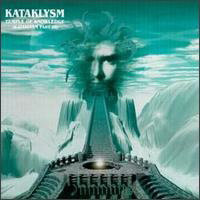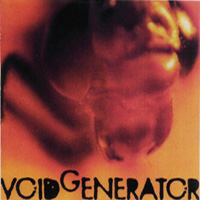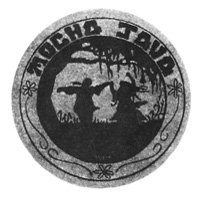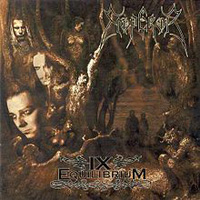 Emperor
Emperor
IX Equilibruim (Century Media)
An interview with vocalist/guitarist Ihsahn
by Scott Hefflon
Not to dredge up the past yet again because I’m sure you’d rather focus on the band, the music, and the present, but perhaps it’d be safe to say that the book, Lords of Chaos, covered the situation [church burnings, murder, prison sentences, media sensationalism] well enough so we won’t have to talk about it.
I haven’t read it, and I’m not interested. I personally had no involvement. Yes, I play in Emperor and I knew all these people, but all the sensationalism of Emperor being involved, it was members of Emperor, not the band itself. Those things happened outside of the band. I don’t want Emperor to be known for things that happened outside of the band. The black metal scene stems from that time, but I don’t think that’s the issue anymore.
To me it’s very interesting that a youth rebellion can go to those extremes, involving politics, religion, heritage, as well as violence against property, symbols, and people.
Throughout the years, it’s not unnatural to see youth rebellion create an underground scene. The hippies, for example, tried to do a positive thing, although they used a lot of drugs. That also became a scene with music, people as “leaders,” a certain way to dress, certain ideas to follow… And punk in the ’70s was no different. Every decade has its own rebellion.
That was then, this is now. What changes have occurred as a band since the early years?
When we wrote In the Nightside Eclipse we were 15 or 16, and now that we’re well over 20, it would be very sad if we didn’t see things differently.
 Your voice is also much more mature and well-rounded. You can do things with it now that you couldn’t before.
Your voice is also much more mature and well-rounded. You can do things with it now that you couldn’t before.
Of course. It would also be very sad if that hadn’t changed.
Black metal purists, like any hangers-on to a genre style that’s moved on, may resent the changes from your early, “pure” days.
I can understand that as well. I’m like that with some bands. My favorite Iron Maiden album is Seventh Son for a Seventh Son, everything they released after that, I don’t care about. They’re reforming now with Bruce Dickinson and Adrian Smith, but it’s ten years after Seventh Son… and I don’t expect them to make another album like that.
Mine were Number of the Beast and Piece of Mind. Somewhere in Time and everything after just never got under my skin. I think it really matters how old you are and what you got first. Others may be just as good, but they don’t affect you like the first records you heard.
Like my favorite black metal album is Bathory’s Blood Fire Death, their fourth album. That was the first I heard, and that’s the one I have the most feelings for.
Bathory and Venom are often credited as having inspired black metal (or are the forefathers, depending on how you look at it), and while they’re from California and they show no traces anymore, I always include Slayer in the mix. Are you, or were you, a Slayer fan?
Not me personally, but both Samoth (guitar) and Trym (drums), especially Trym, are huge Slayer fans. I don’t think any of us were very big Venom fans, but we liked Destruction and Celtic Frost, and other older bands were obviously influential.
I reviewed the Peccatum CD you, your wife, and your brother-in-law did. I sense that, to you, it’s about creating, albeit sometimes in a destructive environment.
Definitely. And while sometimes it involves destructive imagery, that’s the contrast of it. In my town there is an author who’s been winning prizes for his latest novel, but he went through two or three years of very deep depression. Again, that’s the emotional contrast that leads to creativity. The destruction adds up and can lead to constructiveness. But often it’s subversive. Sometimes there is a dead period where nothing comes out, and in many cases there is only destruction. Being an artist is not the kind of work you can do on a daily basis, you have to follow a flow…
You mentioned the hippies and now we’re talking about creative frames of mind and depression: Do you do any kind of drugs?
I’m very much against drugs. I think emotional experiences should be experienced with a clear mind. I consider drugs cheating. And it kind of pisses me off when older artists or idols died from overdoses or something related and then their songwriting is considered ten times better. They may have been creative, but they were self-destructive, had bad attitudes, and were very bad role models.
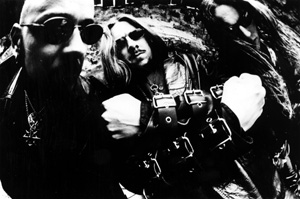 As black metal becomes more and more symphonic, it often borders on classical when done intricately, and Goth when done broodingly. And yet Goth is usually passive, melancholy, and hopeless, whereas black metal has its roots in chaos, aggression, and destruction.
As black metal becomes more and more symphonic, it often borders on classical when done intricately, and Goth when done broodingly. And yet Goth is usually passive, melancholy, and hopeless, whereas black metal has its roots in chaos, aggression, and destruction.
You see quite a few bands with roots in black and death metal turning toward a more commercial sound and market. I used to get fan mail from the bassist of Moonspell back when they were a black metal band, and suddenly now they’re all Gothic.
Wasn’t there a side project of Moonspell called Daemonarch that went back to the extreme roots? That was pretty extreme, right?
Yeah, I suppose.
You don’t sound convinced.
You see it all the time, in all the underground scenes. The commercial market comes in and picks it up and makes a smoother, nicer version of it so normal people can feel they’re a bit crazy.
Is it still important for you to be extreme?
My motive is to make music, the best music I can, whatever kind of music I feel. I’d never compromise my music or my lyrics to please anyone. You have to make compromises in the work as a musician in order to survive as a band, but the art itself should never be compromised.
Tell me about the new album: There are thrash elements, traditional heavy metal influences, you actually sing sometimes here…
The new album is beyond the preconception of black metal. I see it as a variety of metals. We have some old school Bathory and Celtic Frost style, maybe some more powermetal and Rob Halford vocals…
Yeah, you did some falsetto screams in there. Is that new for you?
I did it on the Peccatum album as well.
You also use some male choir kinda things, too. I’m thinking, I dunno, Arcturus and Borknagar.
Garm, from Ulver (formerly of Borknagar), has been doing that for quite a while. Have you heard Arcturus’ remix album called Disguised Masters?
No, but I have La Masquerade Infernale.
It’s a drum’n’bass version of that album. There’s even rapping on it. It’s very good, very open-minded.
Tell me a bit about Peccatum. It’s a full-time band?
Yes, we just did a European tour with Emperor, both my bands.
You write the music, she writes the lyrics?
At this point, yes. But the music for the next album will be different and we’ll be bringing in more musicians.
You’re also working on a solo project, right?
Thou Shalt Suffer, which is mostly classical music. That was the name of the band we had before Emperor. I kept it on as a solo thing, and it’s evolved from quite experimental, strange music into more and more classical music.
Some black metal members seem to be leaning toward classical these days, and one thing I didn’t realize when I interviewed him was that Christofer Johnsson of Therion [a former black/death metal band that mixes metal, classical, and operatic singing] almost had his house set on fire by a girl claiming allegiance to Varg “The Count” Vikernes.
I didn’t know that. When I met him in France on tour for the last album, he was very skeptical towards me. Perhaps that explains it. Any enemies he had in the Norwegian black metal scene is between him and a few others, not with me. “The Black Circle,” or whatever the media called it, I don’t think most people in the black metal scene even knew what it was. It was a media construct. There was no organization, but some people made it seem that way. They were just the people being interviewed. There are so many people in the black metal scene with so much imagery and so little… mind. I’m not slagging everyone, but I’m very tired of the label black metal. All the interviews I’m doing now, especially with people who’ve done Emperor interviews before, none of them care about what happened then. At all. It’s old, and it was all sensationalist anyway.
Does it bother you that people keep bringing it up?
Kind of. I don’t care about it.
But you can’t deny that it had an impact on you, that it changed you in some way. What’s something good that came out of it, or what did it change?
That’s very hard to say. It was a very strange time period. Everyone on the inside lost total perspective of what it was about. It all became role playing. People 16, 17, more or less, were very impressionable and just wanted to be a part of something. In Norway, like everywhere else, black metal attracts people who need something to feel like they’re someone. Black metal’s strong imagery gives them something, and they can all be a part of something together. In the beginning, black metal was like 20 people, but when the media paid attention, suddenly there were 4-500 people in Norway alone. There were many sad cases, people who didn’t fit in.
There are misfits who stand alone, reveling in their individuality, and there are misfits who are just people who can’t find where they fit in.
That’s not to say something bad about them, but it’s destiny. I think what happened was very bad for a lot of people. But if you come out the other side and try to see it for what it was, it might help you see things on a larger perspective.
One musical question I’ve always wanted to ask, perhaps stemming from the real-life chaos – how do you see the different pieces come together to form a song? There are often huge jumps and changes, seemingly without transition, yet they’re still songs to you.
There’ll be a riff that just leads to another, and you don’t know where it came from or what inspired it. It’s a complex mixture of very mathematical, conscious composition and listening to your subconscious.
I like the imagery created in the mind while listening to black metal. Are there visuals that run through your head?
Not really, not like that. I know what you mean, but they’re probably abstract visuals, not the type of thing that you can point to and describe, it just comes with the music.

